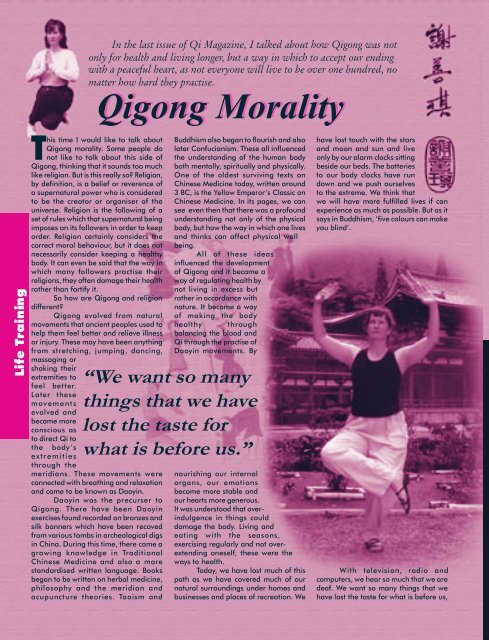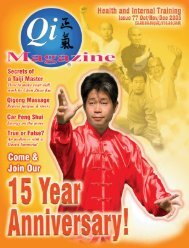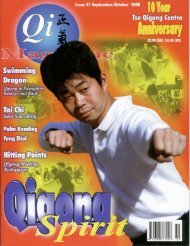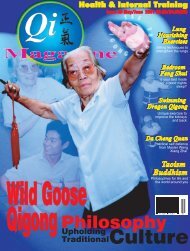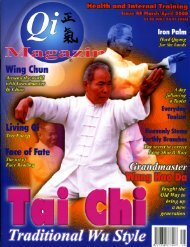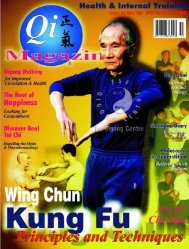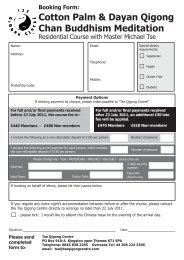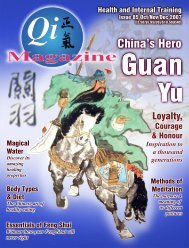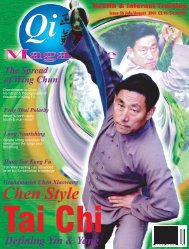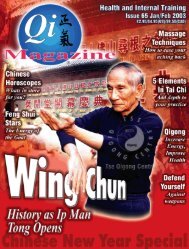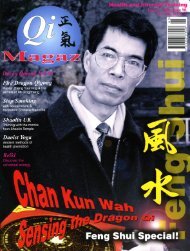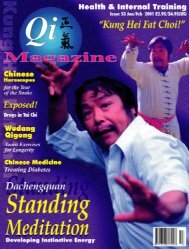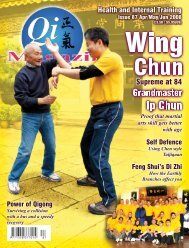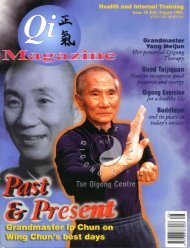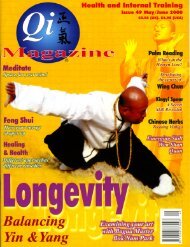Issue 57 - Tse Qigong Centre
Issue 57 - Tse Qigong Centre
Issue 57 - Tse Qigong Centre
Create successful ePaper yourself
Turn your PDF publications into a flip-book with our unique Google optimized e-Paper software.
In the last issue of Qi Magazine, I talked about how <strong>Qigong</strong> was notonly for health and living longer, but a way in which to accept our endingwith a peaceful heart, as not everyone will live to be over one hundred, nomatter how hard they practise.<strong>Qigong</strong> MoralityLife TrainingThis time I would like to talk about<strong>Qigong</strong> morality. Some people donot like to talk about this side of<strong>Qigong</strong>, thinking that it sounds too muchlike religion. But is this really so? Religion,by definition, is a belief or reverence ofa supernatural power who is consideredto be the creator or organiser of theuniverse. Religion is the following of aset of rules which that supernatural beingimposes on its followers in order to keeporder. Religion certainly considers thecorrect moral behaviour, but it does notnecessarily consider keeping a healthybody. It can even be said that the way inwhich many followers practise theirreligions, they often damage their healthrather than fortify it.So how are <strong>Qigong</strong> and religiondifferent?<strong>Qigong</strong> evolved from naturalmovements that ancient peoples used tohelp them feel better and relieve illnessor injury. These may have been anythingfrom stretching, jumping, dancing,massaging orshaking theirextremities tofeel better.Later thesem ov em e nt sevolved andbecame moreconscious asto direct Qi tothe body ’se x tr e m i ti e sthrough themeridians. These movements wereconnected with breathing and relaxationand came to be known as Daoyin.Daoyin was the precurser to<strong>Qigong</strong>. There have been Daoyinexercises found recorded on bronzes andsilk banners which have been recovedfrom various tombs in archeological digsin China. During this time, there came agrowing knowledge in TraditionalChinese Medicine and also a morestandardised written language. Booksbegan to be written on herbal medicine,philosophy and the meridian andacupuncture theories. Taoism andBuddhism also began to flourish and alsolater Confucianism. These all influencedthe understanding of the human bodyboth mentally, spiritually and physically.One of the oldest surviving texts onChinese Medicine today, written around3 BC, is the Yellow Emperor’s Classic onChinese Medicine. In its pages, we cansee even then that there was a profoundunderstanding not only of the physicalbody, but how the way in which one livesand thinks can affect physical wellbeing.All of these ideasinfluenced the developmentof <strong>Qigong</strong> and it became away of regulating health bynot living in excess butrather in accordance withnature. It became a wayof making the bodyhealthy throughbalancing the blood andQi through the practise ofDaoyin movements. By“We want so manythings that we havelost the taste forwhat is before us.”nourishing our internalorgans, our emotionsbecome more stable andour hearts more generous.It was understood that overindulgencein things coulddamage the body. Living andeating with the seasons,exercising regularly and not overextendingoneself, these were theways to health.Today, we have lost much of thispath as we have covered much of ournatural surroundings under homes andbusinesses and places of recreation. Wehave lost touch with the starsand moon and sun and liveonly by our alarm clocks sittingbeside our beds. The batteriesto our body clocks have rundown and we push ourselvesto the extreme. We think thatwe will have more fulfilled lives if canexperience as much as possible. But as itsays in Buddhism, ‘five colours can makeyou blind’.With television, radio andcomputers, we hear so much that we aredeaf. We want so many things that wehave lost the taste for what is before us,Qi Magazine 16


